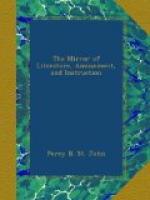Steam Carriages.—By the formation of rail-roads, a loss has occurred in the revenue from stage coaches, to the amount of 8,384_l_.
Electro-Magnetism.—The largest electro-magnet is that constructed by the American philosophers. It is of a horse-shoe form, and weighs about 60 lbs.; around it are 26 coils of wire, the united lengths of which are 800 feet. When excited by about five feet of galvanic surface, it is said to have supported nearly two tons. We here see that the exciting cause of magnetism is the action of the galvanic battery; and a variety of other interesting experiments in electro-magnetics, tend to the conclusion that the magnetic and electric fluids are nearly allied.—Imperial Magazine.
Salary of the Chancellor, 700 years since.—The salary of the Chancellor, as fixed by Henry I., amounted to five shillings per diem, and a livery of provisions.
Dibdin.—On the tombstone of Dibdin, the celebrated song composer, in St. Martin’s, by Pancras New Church, is the first verse of his Tom Bowling:
“His form was of the manliest beauty,
His heart was kind and soft,
Faithful on earth he did his duty,
But now he’s gone aloft.”
Studious Printer.—Morel was an eminent French printer, who sacrificed every thing to study. On being informed that his wife was dying, he refused to quit his pen till he had finished what he was about, and by that time news was brought him that she was dead; to which he coolly replied, “I am sorry for it—she was a good woman.” He died in 1638, at the age of 78. P.T.W.
A Painter’s Retort, or Dangerous Re-touch.—Antonio More, the celebrated painter, was highly favoured by Philip of Spain, whose familiarity with him placed his life in danger; for More ventured to return a slap on the shoulder which the king in a playful moment gave him, by rubbing some carmine on his majesty’s hand. This behaviour was accepted by the monarch as a jest, but it was hinted to More that the holy tribunal might regard it as sacrilege, and he fled, to save himself, into Flanders, where he was employed by the Duke of Alva. P.T.W.
Steam Power.—Mr. Alexander Gordon states, that in various departments of the revenue, the saving of expenditure by the substitution of inanimate for animate power, would, in the Post Office alone, amount to upwards of half a million; whilst, from the cheapness of food which the substitution would produce, the navy and army estimates would be most essentially reduced.
Steam may now be said to maintain the power which can engrave a seal, and crush a mass of obdurate metal like wax before it; draw out, without breaking, a thread as fine as gossamer, and lift a ship of war like a bauble in the air; to embroider muslin, forge anchors, cut steel into ribands, and impel itself against the opposition of the very tempest.
Charlemagne was buried on the day of his death in the great church which he had constructed at Aix-la-Chapelle. The Monk of Angouleme declares that he was inhumed in his imperial robes, and that the pilgrim’s wallet which he wore on his journeys to Rome was also consigned with his body to the tomb.




